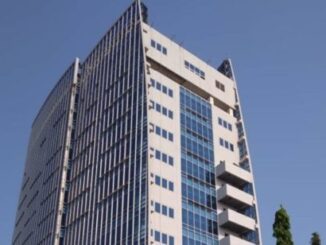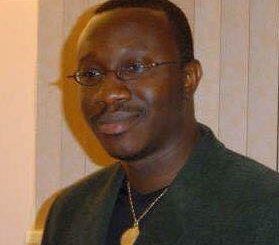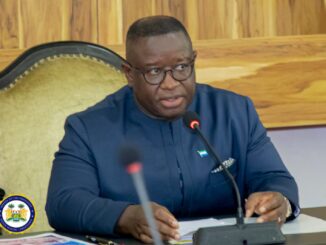by Karamoh Kabba
Monday January 23 , 2006
Sierra Leone and Liberia have many things in common: They are Anglophone-speaking neighbors and hosts to liberated slaves; they had two identical menaces?Charles Taylor and Foday Sankoh and two recently ended acrimonious civil wars; and have two postwar presidents who were employees of the United Nations.
Notwithstanding these striking similarities, the seeming dissimilarities in President Ahmed Tejan Kabbah of Sierra Leone’s postwar inaugural speech in 1996 and that of the newly elected president of Liberia, Ellen Johnson Sirleaf in 2006 have particularly aroused my curiosity. Take a close look at their inaugural speeches and you will notice that they hardly have resemblance. Although they are twelve years apart, one would expect some likeness in inaugural speeches from leaders who have identical problems.
It is not the case. The apparent unlikeness in these two postwar inaugural speeches underscores the action ofdisgruntled soldiers successfully toppling the government of President Kabbah in May 1997. It also helps us to understand why Sierra Leone, after twelve years of President Kabbah’s first inaugural speech, is still unable to wiggle its way out of despondent poverty and why Sierra Leone is unable to control its youth unemployment?the factor that fueled its civil war in the first place. On the other hand, it may likely explain the belief that President Ellen’s Liberia has much potential for development, peace and posterity that has been lacking in President Kabbah’s postwar Sierra Leone.
Both countries are just now rising from the ashes of many years of civil wars that started in Liberia and spilled over intoSierra Leone. The decade-long civil wars in Sierra Leone andLiberia were marked by some of the most unsightly war crimes against humanity. They were caused by other factors such as economic and social marginalization and political intolerance of sectors of the societies by aristocratic and paternalistic regimes in the past. There was also the foreign Realpolitik factor through covert and overt actions compounded by the most popular youth factor in both countries. However, the true origin of both wars could be traced back to the minority Americo-Liberian’s [freed slaves] anachronistic and paternalistic government that ruled the majority native people in Africa’s first Republic [Liberia] for many years until Master Sergeant Doe put an end to it in one of West Africa’s bloodiest military coups on 12 April 1980. That military coup would become the first hiccup on peaceful co-existence that marked a series of violence in the region. Indeed Liberiahad gone wrong exactly 186 years ago when the first American Colonization Society’s ship, the Elizabeth, left the shores of theUnited States in 1820.
Unlike the United States that set up and abated such anachronistic regime in 1847 that invariably marginalized the native man on the rubber plantations of Liberia for over 130 years, the British Crown probably foresaw such a problem when it ended colonization in Sierra Leone by handing power to Sir Milton Margai, a native man from the majority Mende-speaking people of the southern province in Sierra Leone. Through advocacy from then chairman of Senate Foreign Committee, Senator John Tyler Morgan, who would argue on the United States senate floor, “Africa was prepared for the Negro as certainly as the Garden of Eden was prepared for Adam and Eve..” Indeed, Liberia/Sierra Leone among many others were the Garden of Eden for freed slaves where the forbidden fruit flourished on every tree Europeans had sown. In addition, they were there to administer its evil, dose after dose and sow its seed in ridge after ridge in the rubber plantation in Liberia and through colonization in Sierra Leone. It is that seed of a forbidden fruit Europeans sowed in Africa: In Mobutu’s DR Congo, Charles Taylor’s Liberia, Foday Sankoh’s Sierra Leone,Sudan, Rwanda and Burundi, Angola, and many more. Compounded by Mohammad Ghadaffi of Libya’s mischief,Liberia and Sierra Leone set out on a warpath that would last for over a decade. In recent years, after pouring over 500 million dollars in aid on the Doe government between 1981 and 1985, President Reagan’s secretary of state, George P. Shultz would later think aloud “Perhaps I made a wrong career choice, if it was people like that I was going to meet. Doe was unintelligible.” And it is what Howard W French conveys in letters in his well-researched book, “A Continent for the Taking”:
“.Americo-Liberian elite?the class of freed American slaves that had founded this country in 1847. As they settled the land, the Americo-Liberians fondly strove to reproduce the only model they know, the plantation society of the American South. Affecting top hats and morning coats, the freedmen ruled Africa’s first republic in a clannish and conservative manner, established their own curiously paternalistic brand of apartheid, systematically excluding so-called aborigines from positions of privilege and power..”
That we have an insight of the imperial backgrounds ofLiberia and Sierra Leone, let us now examine the profiles of both Tejan Kabbah and Ellen Johnson:
President Kabba was born on 16 February 1932 in Pendembu, in the eastern province district of Kailahun. He was educated in Sierra Leone and England, he studied economics at undergraduate level before he went on to study law, and had a brief work experience with the British colonial system before working as a civil servant in independent Sierra Leone. Before Tejan Kabbah’s over twenty years service with the UN?Development Programme (UNDP) he had become a subject of a commission of inquiry for corruption in Sierra Leone at the Sierra Leone Produce Marketing Board (S.L.P.M.B.). Otherwise, he has traveled widely and has mustered much experience in diplomacy during his international service with the UN. He served in the West Africa Division of UNDP in New York, as the Resident Representative of the UNDP operations in Lesotho,Tanzania, Uganda and Zimbabwe. He retired from the UNDP head office in New York as a coordinator of assistance between the UN and liberation movements such as the African National Congress (ANC) and South West African People’s Organization (SWAPO). His maiden walk on Sierra Leone’s political stage was when the military junta of the National People’s Reform Council (N.P.R.C.) asked him to chair the National Advisory Council that was established to facilitate the restoration of constitutional rule and the drafting of a new constitution for Sierra Leone following the 1992 military coup. He was elected as president of Sierra Leone in 1996 when he became chairman of the Sierra Leone People’s Party (S.L.P.P.).
Ellen Johnson Sirleaf had a turbulent political history; one that can dwarf President Kabba’s into making him appear like an opportunist on the stage of power politics: She was born inMonrovia, the capital city of Liberia on 29 October 1938. Unlike President Kabbah, President Sirleaf is a descendant of Americo-Liberians. She was educated in Liberia and the United States: University of Colorado and Harvard, an Ivy League school, where she gained a masters degree in public administration. She entered politics very early. President Kabba was under the spotlight of a commission of inquiry in Sierra Leone for corruption in 1967 and President Sirleaf had begun a political career, serving as Minister of Finance from 1972?73 in President William Tolbert’s cabinet, a position she would abandon because of public spending disagreement. She was a political prisoner twice in Liberia. She narrowly escaped Samuel Doe’s witch-hunt in the eighties, fled to Kenya and began an international civil service career. It is interesting to note that President Kabbah was in self-exile following corruption investigation while President Sirleaf was fleeing from political persecution. She returned to Liberia in 1985 to participate in politics during which she was sentenced to ten years for opposing Samuel Doe of which she served two years. She was again locked up by Charles Taylor briefly, the man she had supported against Samuel Doe. Like President Kabba, President Sirleaf has a vast experience with the UNDP. From 1992?97 President Sirleaf worked at the UN Development Program Regional Bureau for Africa as Assistant Administrator, and later became the Director. From where she returned toLiberia with iron studs not on soccer boots, but on campaign high-heels to defeat world football star George Weah to become the first African woman head of state.
An overview of both speeches:
President Sirleaf’s inaugural speech is like a handheld web page?very navigable?because of proper and orderly presentation. One can go straight to an issue of interest, read and discard the rest of the speech if so desired. That cannot be said of President Kabba’s inaugural speech?you must read the entire speech to catch a glimpse of the issues of interest here and there. See how President Sirleaf went straight to the issues after few lines of dedication to God, the dead, and her parents. Although her victory mustered very important dignitaries to Liberia for the inauguration, she wasted no time with them?brushing past the name of the American First Lady, Laura Bush and barely mentioning the US?Secretary of State. Before President Kabba said, “I accept the position of President of the Republic of Sierra Leone”, which everyone knew he was not going to say no to, he had burnt four long paragraphs on thanking and praising almost everyone one of his audience and thereafter proceeded to identifying and magnifying the graveness of the state of the nation with nary a concrete plan of action statement. The following paragraphs will examine the speeches issue by issue. I will go by the issues on President Sirleaf’s “handheld web page” for convenience sake.
In retrospect of the wars:
President Kabba: “The tasks ahead are monumental. You are aware that our country stands virtually in ruins, with thousands slaughtered, soldiers and civilians alike, tens of thousands maimed and mutilated, and hundreds of thousands displaced, traumatized, living in poverty, diminished in spirit and body, and the country’s moral, physical, and social infrastructure destroyed.” President Sirleaf: “Today, we wholeheartedly embrace this change. We recognize that this change is not change for change sake, but a fundamental break with the past, thereby requiring that we take bold and decisive steps to address the problems that for decades have stunted our progress, undermined national unity, and kept old and new cleavages in ferment.” President Kabbah went on to discuss the cause in the following paragraph in his speech while President Sirleaf went straight to the solution of the problem when she said: “We pledge anew our commitment to transparency, open government, and participatory democracy for all of our citizens.”
“Political Renewal”:
President Sirleaf: “First, let me declare in our pursuit of political renewal, that the political campaign is over. It is time for us, regardless of our political affiliations and persuasions, to come together to heal and rebuild our nation. For my part, as President of the Republic of Liberia, my Government extends a hand of friendship and solidarity to the leadership and members of all political parties, many of them sitting right in front of me, which participated in our recent presidential and legislative elections. I call upon those who have been long in the struggle – and those who recently earned their stripes – to play important roles in the rebuilding of our nation.” There is nothing for comparison here except that president Kabbah concluded is speech asking Sierra Leoneans to show tolerance “. for the views of others, magnanimity to our transgressors for their many grievous wrongs to use of the past, and turn a new page for the future and for the good of Sierra Leone,” as if he was not a part of that past.
“Economic Renewal”:
Both leaders acknowledged the devastation of their nations’ economies by several years of warring and excessive corrupting by successive regimes. Unlike President Kabbah, President Sirleaf pledged to change that trend by outlining specific plans such as encouraging those investors that will add value to Liberia’s environment in the process of exploiting its natural resources. She discussed how to encourage and give small loans to farmers to jumpstart the economy. She also discussed one common and sensitive topic in both countries that President Kabbah will dare touch; the land tenure system, which is amongst the greatest enemies to many African economies. She promised to revisit with the land tenure system to give investors more flexibility and access to land. She said of revisiting with the land tenure system: “This will call for a transformation of our economic vision into economic goals that are consistent with our national endowment and regional and global dynamics.”
Governance:
President Sirleaf outlined a good way she will make government effective in Liberia. “The workforce in our ministries and agencies is seriously bloated. Our Administration will therefore embark on a process of rationalizing our agencies of government to make them lean, efficient, and responsive to public service delivery. This will require the creation of a meritocracy that places premium on qualification, professionalism, and performance.” President Kabbah made a promise to the people: “The outlines of my government’s policy in the coming years have been set out in my Party’s manifesto. The practical details will be spelt out to you when I publish my government’s legislative programs, hopefully in my maiden speech to Parliament.”
Corruption:
On this very important matter of grave consequence to both nations’ economies, President Sirleaf was emotional when she outlined how she is going to handle corruption in Liberia. She made a pronouncement that “Corruption, under my Administration, will be the major public enemy.” She took a very clear stance on corruption when she enunciated that members of her administration would declare their assets and that she will declare hers first to lead by example. That cannot be said of President Kabbah who went on making promises on every important issue of statecraft, sometimes referring people to his party manifesto as if to say the speech was inferior to the party manifesto. The word corruption appeared once in President Kabbah’s speech when he blamed past regimes for corruption without any insight of how he would make a difference in that area of governance. Whereas President Sirleaf stated; “My Administration will also accord high priority to the formulation and passage into law of a National Code of Conduct, to which all public servants will be subjected,” hammering a big headed nail of credence into her stance on corruption.
Foreign Policy:
On foreign policy, President Sirleaf stressed on the policy of noninterference in other countries and good neighborliness whereas President Kabbah praised foreign dignitaries in almost every paragraph of his speech. He seemed to be more concerned with jubilation of the election victory than talking substance.
Conclusion:
Many would ask why I chose to compare a twelve-year-old speech to a recently delivered one. To this question I will answer that it is an effective comparison of apples to apples?to say that President Sirleaf’s presidency is the first true representation of a non-strongman leadership democracy in Liberia since 1980 when Samuel Doe took power in that nation. Thus, her recent inaugural address perfectly qualifies for the first postwar democratic inauguration in Liberia. Apparently, if President Kabbah had good action plans in his 1996 inaugural address,Sierra Leone would have marked that year as the year of the end of hostilities. But his lethargic approach to leadership surely created the need for the 17,600-strong UN?Peacekeeping Forces?UNAMSIL in Sierra Leone.
Evidently, the threat of violence still looms in Sierra Leone as it approaches the third democratic inauguration in 2007?a journalist was beaten to death recently, and Paul Kamara could barely stand when he came out of the infamous Pandemba road prison after the supreme court acquitted him for reprinting the outcome of an inquiry into President Tejan Kabbah’s past corruption charges. Many journalists are fleeing from persecution and many more are leaving the country after imprisonment. The authorities in President Kabbah’s government are foot-dragging the registration of formidable political parties. Excessive corruption and the prevailing youth unemployment are all signs that President Kabbah’s 1996 inaugural address was empty. Sirleaf on the other hand, in her inaugural address recognized her opponent who carried a good chunk of voters in the elections. That was a good sign that she would be tolerance of her political opponents. It is in itself a commencement of an outstanding leadership, especially when she did not stop short of stating categorically that any one who attempts to disturb the hard-earned peace in Liberia would be dealt with accordingly. Until President Kabbah and his team start looking at the issues transparently and pragmatically, Liberia’s leap to progress will be double leaps over Sierra Leone’s double dips




Leave a Reply